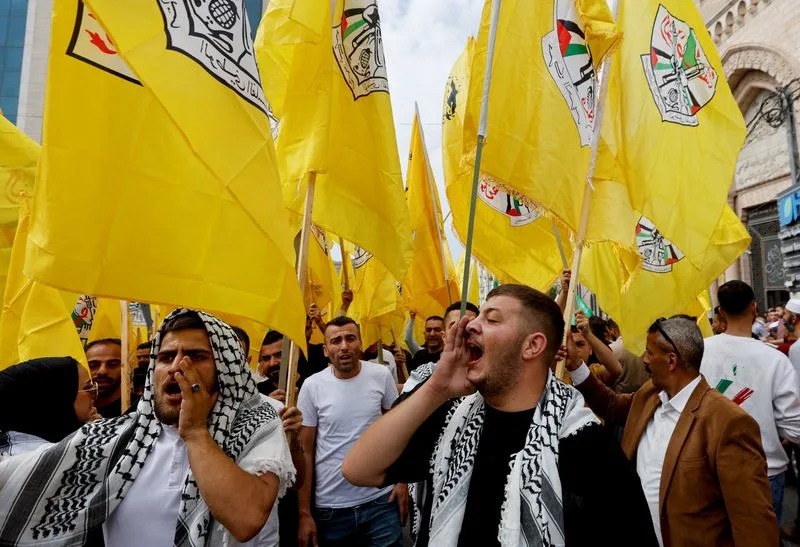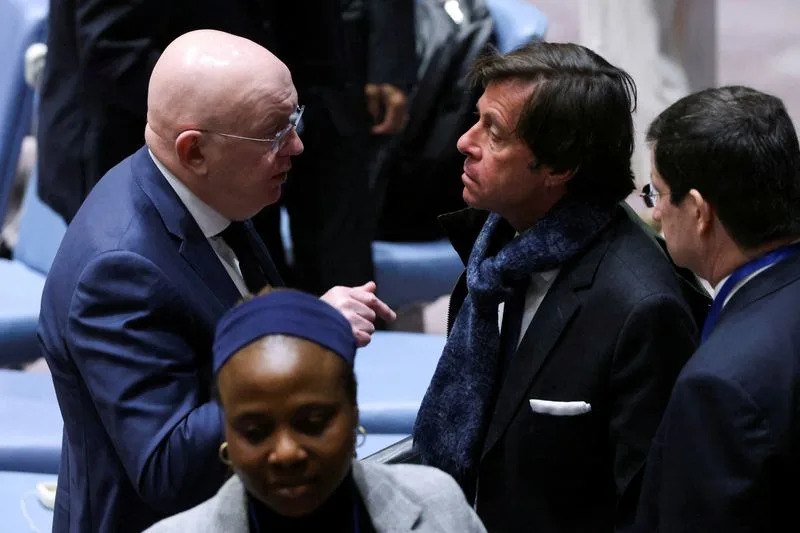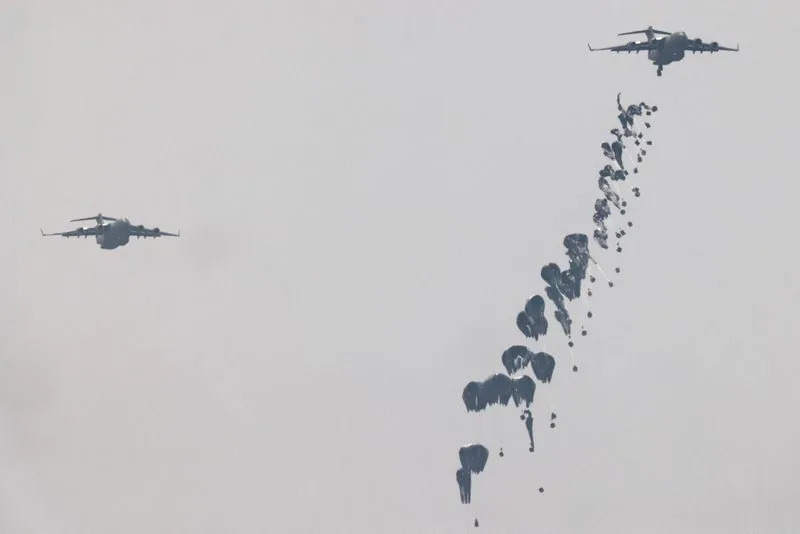Palestinian Fatah group says Iran trying to spread chaos in West Bank

The main Palestinian faction in the occupied West Bank on Wednesday accused Iran of trying to spread chaos in its territory and said it would oppose operations from outside that had nothing to do with the Palestinian cause.
Palestinians protest in support of the people of Gaza, in Hebron.
Fatah, the movement that controls the Palestinian Authority, said it would not allow "our sacred cause and the blood of our people to be exploited" and said it would act against any interference from outside aimed at harming security forces or national institutions.
Israel has long accused Iran of helping Palestinian armed groups including Hamas, the Islamist group in Gaza which led the Oct. 7 attack on Israel, and which has become more deeply entrenched in the West Bank over recent years.
Last month, the Israeli military said security forces had stopped advanced weapons including anti tank mines from being smuggled into the West Bank.
In the past, Iran has not denied providing support to the armed groups, saying whatever backing it gives is at the request of the Palestinians.
The statement from Fatah came as the Palestinian Authority has asked the United Nations Security Council to vote this month to make it a full U.N. member, a move that would add to mounting global pressure for a two state solution with Israel.
Occupied by Israel after the 1967 Middle East war, the West Bank has been at the heart of decades of conflict with the Palestinians, who want the area as the heart of a future independent state that would also include Gaza and have East Jerusalem as its capital.
Hundreds of Palestinians have been killed by Israeli forces since the start of the war in Gaza last October and thousands have been detained, as violence has surged across the area, with more than a dozen Israelis killed in attacks by Palestinians.
France seeks UN Security Council resolution for Gaza truce monitoring
Members of the United Nations Security Council vote on a Gaza resolution that demands an immediate ceasefire, in New York.
France on Monday proposed a draft United Nations Security Council resolution that seeks options for possible U.N. monitoring of a ceasefire in the Gaza Strip and proposals to help the Palestinian Authority assume responsibilities.
"It's an ambitious project. It will take time," French U.N. Ambassador Nicolas de Riviere said of the text, which will need at least 9 votes in favor and no vetoes by the four other permanent members: the United States, Britain, Russia and China.
The draft resolution, seen by Reuters, also calls for an immediate ceasefire between Israel and Palestinians militants Hamas in Gaza and demands the immediate and unconditional release of all hostages still held in Gaza by Hamas and others.
Israel's ally the United States abstained from a vote last month to allow the 15-member council to demand an immediate ceasefire for the Muslim fasting month of Ramadan, which ends next week, and the immediate and unconditional release of all hostages. It has not been implemented by the warring parties.
A truce, including the release of some hostages, last took place in November.
The war began after Hamas fighters attacked Israel on Oct. 7, killing 1,200 people and seizing 253 hostages, according to Israeli tallies.
Israel retaliated by imposing a total siege on Gaza, then launching an air and ground assault that has killed more than 32,000 Palestinians, health authorities in Gaza say.
The draft U.N. text condemns the Oct. 7 attacks by Hamas. Hamas in 2007 ousted the Palestinian Authority from power in the Gaza Strip.
Alongside a push to end the war, global pressure has grown for a resumption of efforts to broker a two-state solution - with an independent Palestinian state alongside Israel.
The draft Security Council resolution "decides that a negotiated solution should be achieved urgently through decisive and irreversible measures taken by parties towards a two-State solution where two democratic States, Israel and Palestine, live side by side in peace."
It also calls for the "massive delivery of humanitarian aid" to civilians in Gaza.
A global authority on food security has warned that famine is imminent in parts of Gaza, where more than three-quarters of the 2.3 million people have been forced from their homes and swathes of the territory are in ruins.
In Gaza, Palestinians risk death in desperate rush for aid
Humanitarian aid falls through the sky towards the Gaza Strip, as seen from Israel
Omar Deeb was nearly hit by Israeli tank fire while searching for food in Gaza, and then saw people killed around him when he set out once more to feed his family in the besieged enclave.
But like many Gazans who could soon face famine he has no choice but to embark on what he calls "death missions", risking his life to provide for his six children, who live in a school shelter.
"If I go, we eat. And if I don't, we don't eat," Deeb, 37, who lives in Gaza City, told Reuters over the phone.
Securing aid has become a life or death scramble in Gaza during a six-month-old Israeli ground and air campaign that has killed over 32,000 Palestinians and wounding more than 75,000, according to Gaza health authorities.
Israel is carrying out the offensive in retaliation for a Hamas attack on southern Israel on Oct. 7 in which 1,200 people were killed and over 200 people were taken hostage, according to Israeli tallies.
The United Nations has warned of a looming famine and complained of obstacles to getting aid in and distributing it throughout Gaza. The U.S. also says famine is imminent.
Deeb hasn't yet healed from wounds sustained when pieces of a building which were blown apart struck him as he tried grab flour from aid trucks entering northern Gaza.
Deeb also came close to death two other times, he said, first on Feb 29 when the Gaza health ministry said over 100 people were killed by Israeli fire as they ventured to get aid.
Israel said the deaths were caused when people were trampled over or run over by trucks carrying aid.
On March 23, he said Israel opened fire at an aid drop point at Gaza's Kuwait roundabout, where several other people were killed around him, mostly members of the Popular Committees, a body formed of traditional family clans and factions to secure aid convoys.
DESPERATE AND HUNGRY
"Every time (I go) it feels like the last time," said Deeb.
"Therefore, I pay farewell to my wife and children. I ask my wife to forgive me, the children too," said Deeb, whose son aged five was killed in an Israeli strike on his house in December.
Contacted by Reuters, the Israeli military had no immediate comment on the Palestinian allegation that it puts seekers of aid in danger. On March 23, the Israeli military said its forces had not fired at people in the aid convoy in the Kuwait roundabout incident, according to its preliminary findings.
Israeli officials say they have increased aid access to Gaza, are not responsible for delays and that the aid delivery inside Gaza is the responsibility of the U.N. and humanitarian agencies. Israel has also accused Hamas of stealing aid, a charge Hamas denies.
Underscoring the chaos in Gaza, citizens from Australia, Britain and Poland were among seven people working for celebrity chef Jose Andres' World Central Kitchen who were killed in an Israeli airstrike in central Gaza on Monday, the NGO said.
"The last time I ate meat, it was chicken -- it was a week before the war," said Deeb.
Desperate and hungry, thousands like Deeb head to aid drop points when night falls to secure some flour or canned food.
They learn about incoming drops from aid truck drivers who phone it in to their relatives, who in turn spread the word.
"When the aid trucks reach Deir Al-Balah in central Gaza, my neighbour's relative (the driver) gives him a call, and we rise up to go, regardless of what time it is," he said.
When Deeb and others scramble to aid drop spots, others like Abu Mahmoud, a member of the Popular Committees, beat their way to the food with sticks to try to keep order. Some other members, mostly from Hamas, have guns.
ATTACKS, CROWDS, THIEVES
With Israeli forces sworn to eliminate Hamas, it has become highly risky for anyone linked to the Islamist group to emerge into the open to protect aid deliveries to civilians, so the job is being done by the popular committees.
Gaza has several large traditional family clans, some of them widely believed to be heavily armed.
A former Hamas-hired public servant, Abu Mahmoud has survived death in both locations mentioned by Deeb. At one of those incidents he lost three of his friends, he told Reuters.
These men see their risky mission as no less important than fighting Israel, says Abu Mahmoud, a father of five.
"It is a mission to martyrdom," said Abu Mahmoud, who declined to give his full name for fear of Israeli reprisals.
Sources in the Popular Committees put the number of members who had been killed in the past month at about 70. According to sources in the clans and the popular committees, these 70 were killed by Israeli strikes in different aid drop locations.
Abu Mahmoud said the main obstacle for getting the aid to northern Gaza has been Israeli attacks which killed or wounded several of them everyday.
Another problem is big crowds of people who rush to get aid. Sometimes there are greedy thieves, not hungry Gazans, residents and members of the popular committees say.
"Our mission is very risky, we can't open fire at people, we don't want that. So mostly some fire into the air to disperse the thieves," said Abu Mahmoud.
- Questions and Answers
- Opinion
- Story/Motivational/Inspiring
- Technology
- Art
- Causes
- Crafts
- Dance
- Drinks
- Film/Movie
- Fitness
- Food
- Games
- Gardening
- Health
- Home
- Literature
- Music
- Networking
- Other
- Party
- Religion
- Shopping
- Sports
- Theater
- Wellness
- News
- Culture
- War machines and policy




